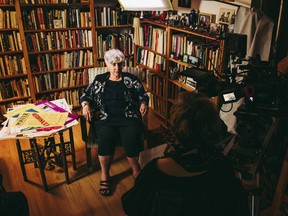Documentary film Analogue Revolution focuses on feminist media in Canada in the 1960s-1990s

Reviews and recommendations are unbiased and products are independently selected. Postmedia may earn an affiliate commission from purchases made through links on this page.
Article content
As we’re fully engulfed in the digital age, the opening film of this year’s GEMFest (Gender in Media Festival) is a reminder of the power of collective — and in-person — organizing.
The feature documentary from Toronto-based filmmaker Marusya Bociurkiw titled Analogue Revolution: How Feminist Media Changed the World kicks off the 19th-annual GEMFest, previously known as the Vancouver International Women in Film Festival (VIWFF), on March 5 at 6:30 p.m. with a screening followed by a director Q-and-A and a reception. The festival runs until March 9 at the VIFF Centre.
Article content
At GEMFest, Analogue Revolution joins 36 other films from 14 countries. Of those films 14 are Canadian and six are from B.C. filmmakers. The festival also offers a robust slate of short films as well as other events and panels. A virtual festival will run online March 12-26. Visit the GEMS (Gender Equity in Media Society) website here for more information on the festival and lineup.
Advertisement 2
Article content
Analogue Revolution focuses on feminist media in Canada in the 1960s-1990s. During that time in Canada, over 900 feminist publications and newsletters existed. There were also dozens of film/video collectives, radio programs, and film festivals at the time.
“The film is also about technology. I’m sort of arguing that we got more done with analogue technologies, because we had to make the networks ourselves. There weren’t algorithms steering us,” said Bociurkiw during a phone call from Toronto.
By showcasing the work of Bonnie Sherr Klein, Sylvia D. Hamilton, Nora Randall, Bev Davies, Nancy Pollak and many others alongside collectives such as Press Gang and Our Lives: Black Women’s Newspaper, the film shows the depth of the intersectionality that existed in the feminism movement and the power of collective pressure.
“Feminism is not an individual. It’s not a lifestyle. It’s not an individual pursuit,” said Bociurkiw, who founded the video collective Emma Productions (1983-1987). “It is collective organizing. And that’s how you get things changed, like abortion laws and birth control, and domestic violence law. The fact that we sort of have universal daycare now, that’s not because of Trudeau. That’s because of 40 years of organizing by feminists.”
Advertisement 3
Article content

GEMFest organizers were thrilled to secure this film for its opener as it is both a history lesson and a blueprint for effective activism.
“Ultimately, my goal is for audiences to be inspired not only by the stories presented in Analogue Revolution, but also by the broader message it conveys — a call to action for fostering a community that values diversity, celebrates the achievements of women in film, and actively works towards creating an inclusive future for the industry,” Patrycja Mila Kamska, GEMSFest programs and events manager, said in an email.

While Analogue Revolution focuses on Canadian feminist media between the 1960s-1990s, it is very much a relevant offering for today as gender rights are being challenged around the globe.
“Something that came up a lot when we were filming was Roe versus Wade, it had just been overturned and it made these veteran feminist organizers really think more clearly how important their work was,” said Bociurkiw, a professor emerita at Toronto Metorpolitian University. “I think now more than ever young folks, especially young women, need to know what tools they have available to them — strategically, historically. And to not reinvent the wheel in terms of working towards restoring or rebuilding women’s rights.”
Recommended from Editorial
Article content





